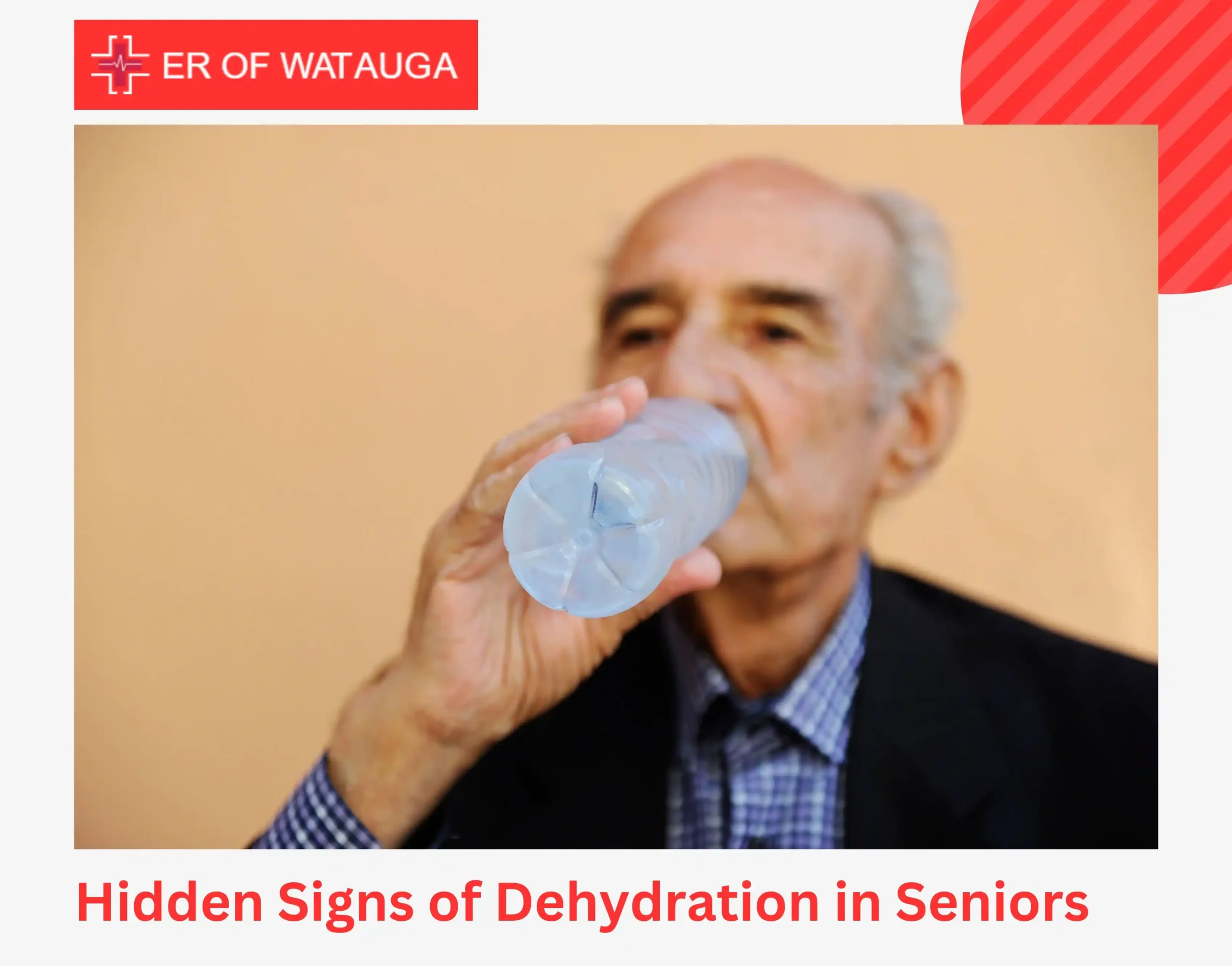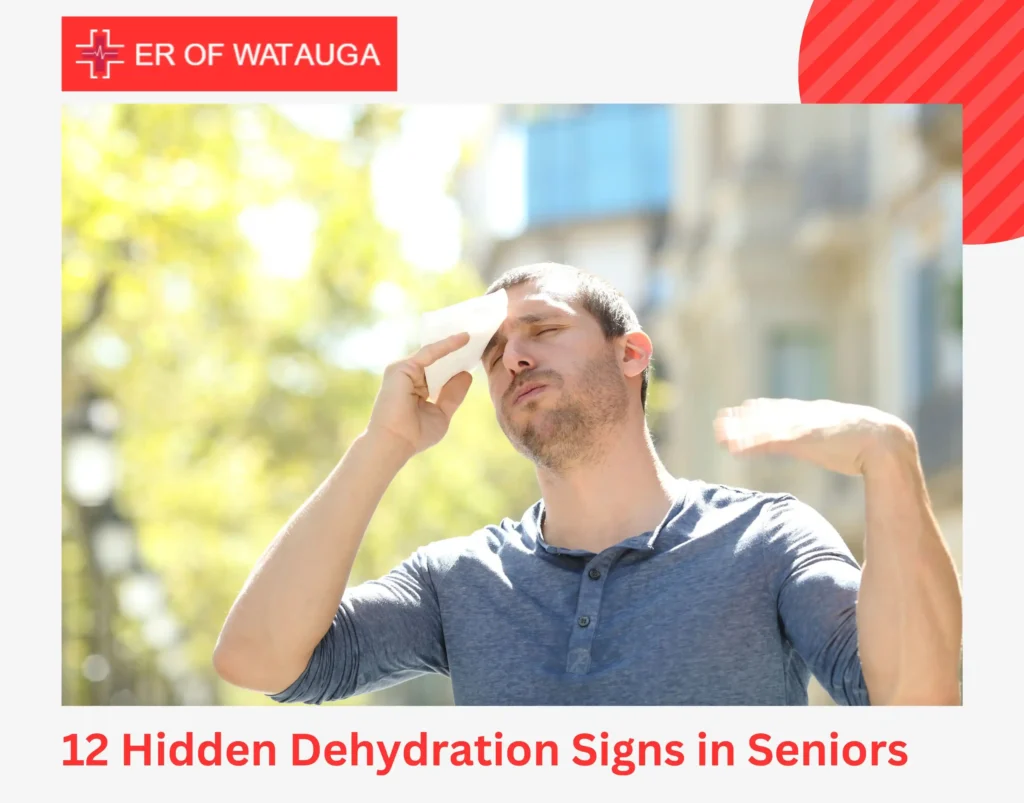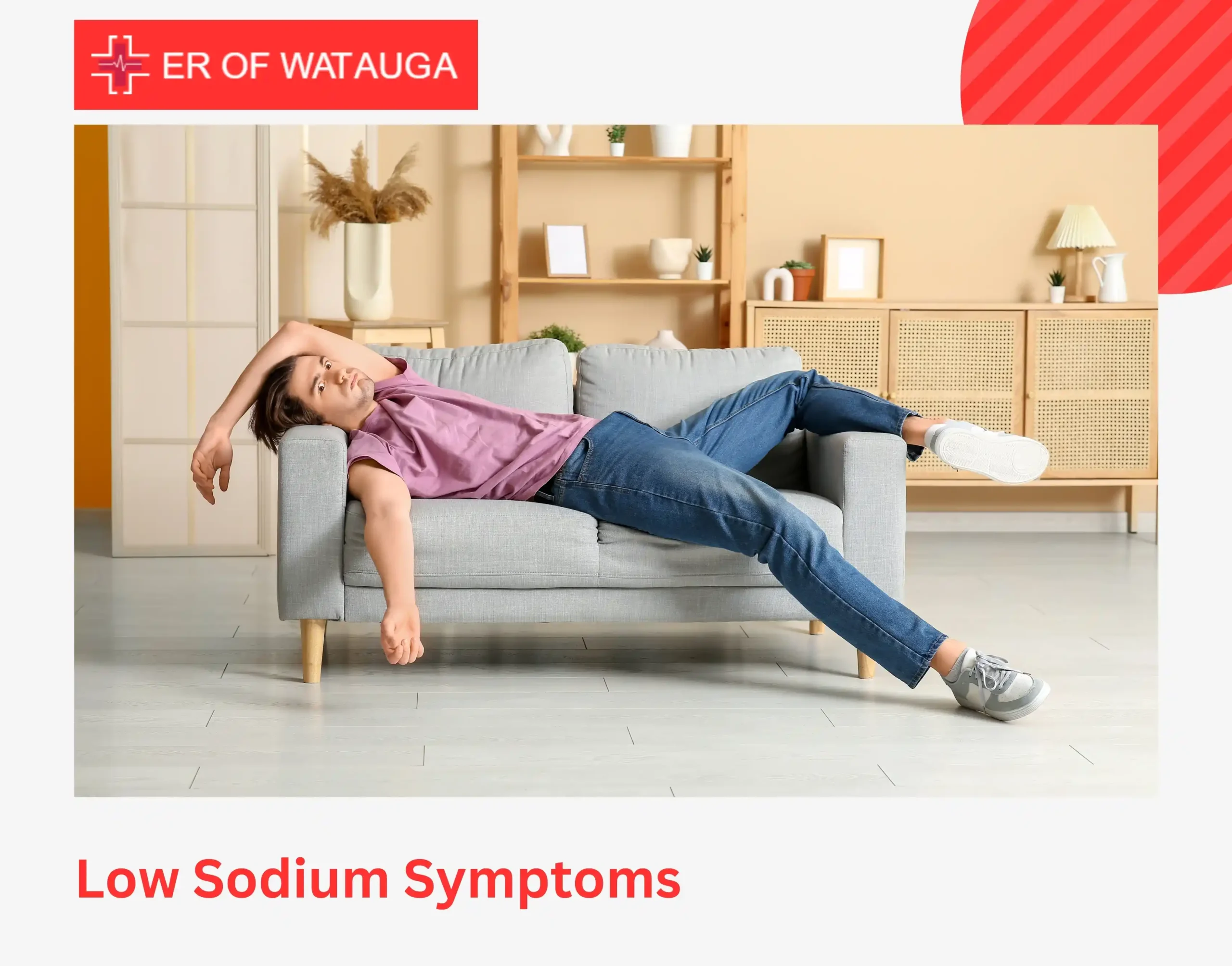Confusion, dry mouth, or sudden fatigue in seniors often gets dismissed as “just getting older.” But these could be hidden signs of dehydration in seniors that goes unnoticed until it becomes an emergency.
Seniors face unique risks because their bodies hold less water while many medications increase fluid loss. What starts as mild symptoms can rapidly develop into serious health complications in elderly.
So what subtle warning signs should families watch for, and how does our ER of Watauga team address dangerous dehydration in seniors before it threatens their lives?
12 Hidden Dehydration Signs in Seniors
Many dehydration symptoms in seniors can be easily overlooked or mistaken for other conditions. Let’s go over the warning signs, so you can act quickly before permanent damage occurs
Physical Clues Most Seniors Miss
The body often shows subtle physical changes when fluids run low:
- Dry skin elasticity that doesn’t bounce back when pinched. Properly hydrated skin should quickly return to normal when gently pulled.
- Unexplained muscle cramps, particularly in the legs, which signal electrolyte imbalances from insufficient fluid intake.
- Persistent headaches that worsen as the day progresses, often indicating reduced blood volume.
- Reduced sweating even during warm weather or light activity, suggesting the body lacks adequate fluid reserves.
Changes in Mood or Alertness
Mental changes are often the most alarming yet frequently misattributed symptoms:
- Sudden confusion or disorientation, especially appearing in the afternoon or evening, that families often mistake for dementia progression.
- Increasing irritability, agitation, or mood swings without other clear causes.
- Unexpected drowsiness or lethargy after previously normal energy levels.
- Difficulty concentrating or focusing on familiar tasks that typically wouldn’t pose problems.
Stomach Red Flags
Digestive and urinary systems also provide clear indicators of hydration status:
- Dark urine color (amber or honey-colored rather than pale yellow), indicating concentrated waste products.
- Reduced urination frequency – going less than four times daily suggests the kidneys are working to conserve fluid.
- Persistent constipation as the body pulls water from the intestines.
- Dry mouth, cracked lips, or decreased saliva that makes swallowing more difficult.
Why Seniors Are More Likely to Get Dehydrated
Several factors make older people more vulnerable to dehydration risks. Understanding these causes of dehydration in seniors can help you prevent these problems before they start.
Natural Body Changes with Aging
The aging body becomes increasingly vulnerable to fluid imbalance. Total body water content naturally decreases by about 10% between ages 50 and 80, creating a smaller reservoir. The kidneys’ ability to concentrate urine reduces, so more water passes through even when the body needs conservation.
Perhaps most critically, the thirst mechanism weakens substantially. Many seniors simply don’t feel thirsty until significant dehydration has already developed. The body’s warning systems fail precisely when they’re needed most.
Medications That Cause Fluid Loss
Many common prescriptions accelerate fluid loss in seniors. Diuretics prescribed for heart conditions or blood pressure directly increase urination. ACE inhibitors, common blood pressure medications, can affect kidney function and fluid balance.
Even over-the-counter medicines like antihistamines and certain pain relievers create drying effects. Most concerningly, many seniors take multiple medications with compounding dehydration risks without realizing the combined impact on their fluid needs.
Struggles with Movement or Memory
Physical and cognitive limitations create practical barriers to hydration in elderly. Many seniors deliberately restrict fluid intake due to mobility challenges that make kitchen or bathroom trips difficult, leading many seniors to deliberately restrict fluid intake.
Even those who understand the importance of hydration simply forget to drink regularly due to memory impairments. Additionally, swallowing difficulties from stroke or other conditions can make drinking physically uncomfortable.
Poor Sleep and Dehydration in Adults
Sleep quality and hydration status share a two-way relationship that many seniors don’t realize. When the body lacks proper fluids, sleep suffers from problems like nighttime leg cramps and dry throat discomfort.
Conversely, poor sleep disrupts the hormones that maintain proper fluid balance during rest hours. This creates a frustrating cycle where dehydration in seniors causes sleep problems, and poor sleep makes dehydration worse.
Many seniors take sleep medications without addressing the underlying hydration issues. Simply drinking enough water throughout the day (not right before bedtime) can significantly improve both sleep quality and overall hydration.
Easy Ways to Prevent Dehydration in Seniors
Now that we understand the risks, let’s talk solutions. Simple, consistent approaches work best for seniors to prevent dehydration.
- Begin your day with water first. Drink a full glass before reaching for coffee or tea to jumpstart hydration when the body needs it most.
- Sneak extra fluids through fluid-rich foods like watermelon, cucumber, oranges, and yogurt that contribute significantly to daily water intake.
- Link drinking to daily routines. Keep water by medication bottles, beside favorite chairs, or set water breaks during TV commercials.
- Make water more appealing with natural flavors from berries, citrus slices, cucumber, or mint leaves.
Tools to Track and Encourage Drinking
Visual reminders can make drinking water more appealing even when you don’t feel like drinking:
- Try water bottles with time markers showing drinking goals throughout the day. This simple visual can remove guesswork.
- Keep hydration visible with a small chart on the refrigerator where completed glasses earn checkmarks or stickers.
- For tech-savvy seniors, smart water bottles with gentle reminder lights or apps can track progress without feeling medical.
- Create “hydration spots” in frequently visited areas throughout the home. Seeing water can trigger drinking.
Helping Seniors Feel Comfortable Drinking
Address practical concerns that might discourage adequate hydration:
- Plan outings with known bathroom locations to reduce anxiety about urgency.
- Make drinking physically easier with lightweight cups, two-handled mugs, or adaptive straws for those with arthritis or swallowing challenges.
- Offer beverages at preferred temperatures. Many seniors develop sensitivity to very cold drinks but enjoy room temperature options.
- For those with dementia, offer drinks during social interactions where gentle reminders feel like normal conversation.
How ER of Watauga Treats Dehydration in Seniors
When dehydration becomes severe enough for emergency care, our treatment focuses on rapid and controlled rehydration.
IV Fluids Therapy
IV fluid therapy provides the fastest route to rehydration. It bypasses the digestive system to deliver fluids directly to the bloodstream. Our emergency physicians select specific IV solutions based on the senior’s electrolyte levels, with saline or lactated Ringer’s solution most commonly used.
Blood Tests
Our on-site blood tests help us identify any underlying cause like infection, kidney problems, or medication effects that contributed to the dehydration. Our team also monitors vital signs, including heart rate and blood pressure, and track improvement as fluids restore normal function.
Once stabilized, we create a discharge plan addressing the specific factors that led to dehydration in that patient.
Emergency Care for Dehydration in Seniors
Many families tell us they wish they’d recognized dehydration sooner in their older loved ones. The signs often hide in plain sight. Confusion mistaken for dementia, fatigue attributed to age, or decreased urination that goes unnoticed. Yet proper hydration remains one of the simplest ways to maintain health in our senior years.
Prevention beats treatment every time. A few consistent habits, some thoughtful tools, and addressing practical barriers can keep most seniors safely hydrated. When these measures fall short, don’t hesitate to seek medical attention. Our emergency physicians at Watauga ER have seen too many cases where waiting made matters worse.
Remember that hydration isn’t just about comfort, it’s about protecting brain function, kidney health, and overall quality of life. Your attentiveness to these seemingly small details might just prevent your loved one’s next emergency room visit.
FAQs
1. How much water should seniors drink daily to prevent dehydration?
While the traditional “8 glasses” rule provides a starting point, many seniors need 7-8 cups of fluid daily, including water and other beverages. Medical conditions and medications may increase this need. Rather than focusing on a strict amount, watch urine color (pale yellow indicates good hydration) and ensure consistent intake throughout the day rather than large amounts at once.
2. Can medications cause dehydration in older adults?
Yes, many common medications prescribed to seniors directly increase dehydration risk. Diuretics (water pills) for heart failure or hypertension intentionally increase urination. ACE inhibitors, certain diabetes medications, and even over-the-counter drugs can reduce fluid levels. Never stop prescribed medications, but discuss hydration strategies with your doctor if taking these medications.
3. How quickly can IV fluids treat dehydration in elderly patients?
IV fluid therapy often shows improvement within 1-2 hours for moderately dehydrated seniors. Mild symptoms like headache and dry mouth often resolve first, while more severe symptoms like confusion may take longer to improve.









